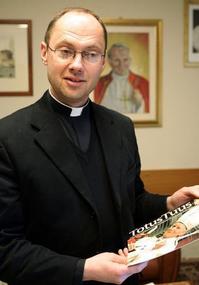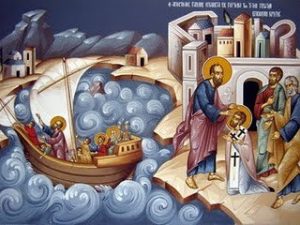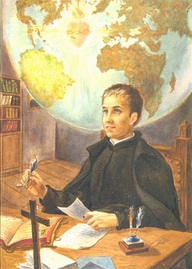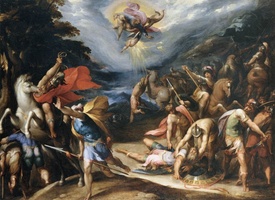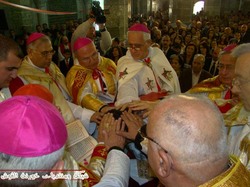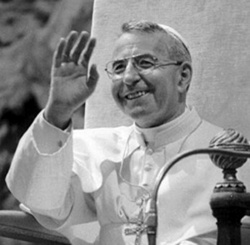
Earlier this morning I was poking around the Vatican website reading some of the pieces posted in the section on Pope John Paul I. The General Audience of September 6, 1978 is a striking reminder of how a Christian ought to live: in a mode of gratitude. The Pope’s address is so simple that the profundity is extraordinarily beautiful and reasonable. Pope John Paul I did very few things in his month long pontificate that after reading some of the things I did today, I wonder with awe of this man, a pope, a witness to Jesus Christ who went prematurely to the Lord. Or did He?
To be good, however, it is necessary to be in place before God, before our neighbour and before ourselves. Before God, the right position is that of Abraham, who said:
“I am only dust and ashes before you, O Lord!” We must feel small before God. When I say, “Lord I believe” I am not ashamed to feel like a child before his mother; one believes in one’s mother; I believe in the Lord, in what he has revealed to me. The commandments are a little more difficult to observe; but God gave them to us not to satisfy a whim, not in his own interest, but solely in our interest.
Once a man went to buy a motorcar from the agent. The latter talked to him plainly: “Look here, it’s a good car; mind that you treat it well: premium petrol in the tank, and for the joints, oil the good stuff.” But the other replied: “Oh, no, for your information, I can’t stand even the smell of petrol, nor oil; I’ll put champagne, which I like so much, in the tank and I’ll oil the joints with jam” “Do what you like: but don’t come and complain if you end up in a ditch, with your car!” The Lord did something similar with us: he gave us this body, animated by an intelligent soul, a good will. He said, “this machine is a good one, but treat it well.”
Here are the commandments. Honour your father and your mother; do not kill; do not get angry; be gentle; do not tell lies; do not steal… If we were able to observe the commandments, we would be better off and so would the world. Then there is our neighbour… But our neighbour is at three levels: some are above us; some are at our level; some are below. Above, there are our parents. The catechism said: respect them, love them, obey them. The Pope must instil respect and obedience in children for their parents. I am told that the choir-boys of Malta are here. Let one come here, please … the choir-boys of Malta, who have served in St Peter’s for a month. Well, what is your name?
–James!
–James. And listen, have you ever been ill?
–No.
–Ah, never?
–No.
–Never been ill?
–No.
–Not even a temperature?
–No.
–Oh, how lucky you are! But when a child is ill, who brings him a little broth, some medicine? Isn’t it his mother? That’s it. After wards you grow up, and your mother gets old; you become a fine gentleman, and your mother, poor thing, will be in bed, ill. That’s it. Well, who will bring the mother a little milk and medicine? Who will?
–My brothers and I.
–Well said! “His brothers and he,” he said. I like that. Did you understand?
But it does not always happen. As Bishop of Venice, I sometimes went to homes. Once I found an elderly woman, sick.
–How are you?
–Well, the food is all right!
–Are you warm? Is there heating?
–It’s good.
–So you are content?
–“No” She almost began to cry.
–But why are you crying?
–My daughter-in-law, my son, never come to see me. I would like to see my grandchildren.
Heat and food are not enough, there is the heart; we must think of the heart of our old people. The Lord said that parents must be respected and loved, even when they are old. And besides our parents, there is the State, there are superiors. May the Pope recommend obedience? Bossuet, who was a great bishop, wrote: “Where no one commands, everyone commands. Where everyone commands, no one commands any longer, but chaos.” Sometimes something similar is seen in this world too. So let us respect those who are our superiors.
Then there are our equals. And here, there are usually two virtues to observe: justice and charity. But charity is the soul of justice. We must love our neighbour, the Lord recommended it so much. I always recommend not only great acts of charity, but little ones. I read in a book, written by Carnegie, an American, entitled “How to Make Friends”, the following little episode:
A lady had four men in the house: her husband, a brother, two grown up sons. She alone had to do the shopping, the washing, the ironing and the cooking: everything all alone. One Sunday they come home. The table is laid for dinner, but on the plate there is only a handful of hay. “Oh!”, the others protest and say: “What! Hay!” And she says, “No, everything is ready. Let me tell you: I prepare your food, I keep you clean, I do everything. Never once have you said: ‘That was a good dinner you made for us.’ But say something! I’m not made of stone.”
People work more willingly when their work is recognized. These are the little acts of charity. In our home we have all some one who is waiting for a compliment.
There are those who are smaller than we are; there are children, the sick, even sinners. As Bishop, I was very close even to those who do not believe in God. I formed the idea that they often combat not God, but the mistaken idea they have of God. How much mercy it is necessary to have! And even those who err…. We must really be in place with ourselves. I will just recommend one virtue so dear to the Lord. He said, “Learn from me who am meek and humble of heart”. I run the risk of making a blunder, but I will say it: the Lord loves humility so much that, sometimes, he permits serious sins. Why? In order that those who committed these sins may, after repenting remain humble. One does not feel inclined to think oneself half a saint, half an angel, when one knows that one has committed serious faults. The Lord recommended it so much: be humble. Even if you have done great things, say: “We are useless servants.” On the contrary the tendency in all of us, is rather the contrary: to show off. Lowly, lowly: this is the Christian virtue which concerns ourselves.
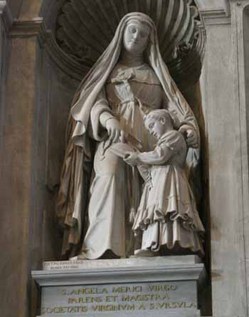 Born in northern Italy in 1474, Angela Merici was orphaned by
Born in northern Italy in 1474, Angela Merici was orphaned by